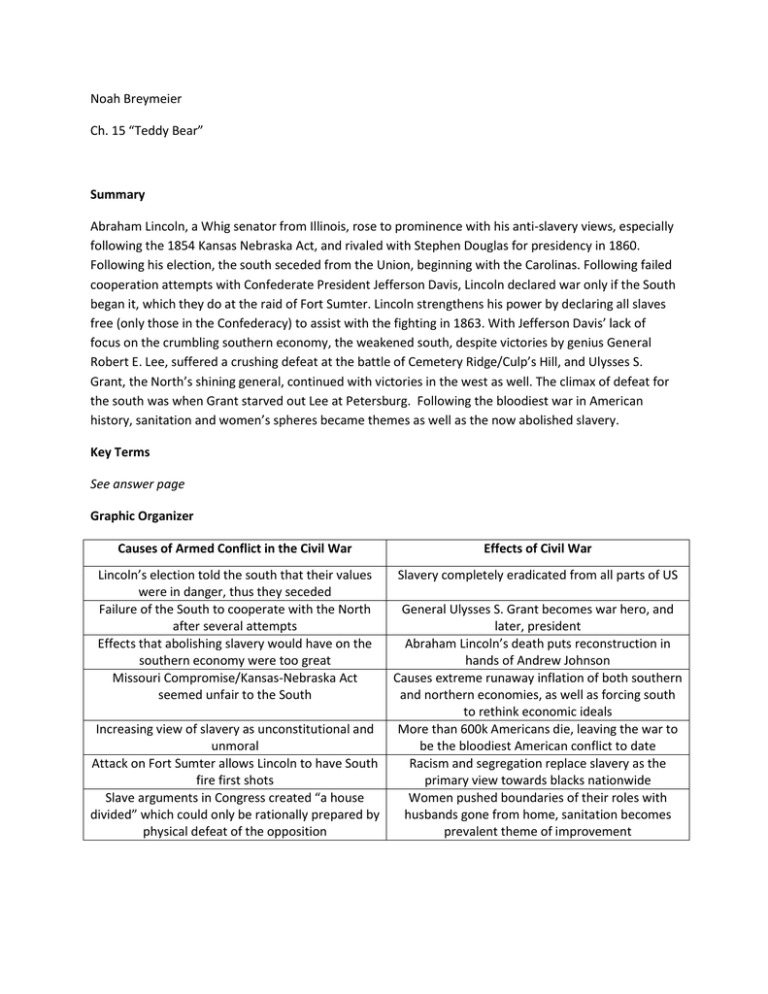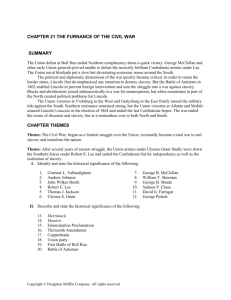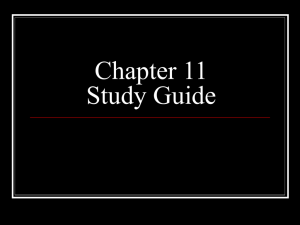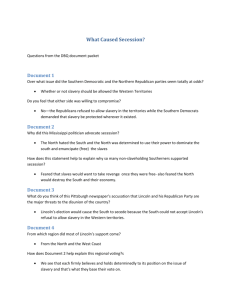Noah Breymeier Ch. 15 “Teddy Bear” Summary Abraham Lincoln, a
advertisement

Noah Breymeier Ch. 15 “Teddy Bear” Summary Abraham Lincoln, a Whig senator from Illinois, rose to prominence with his anti-slavery views, especially following the 1854 Kansas Nebraska Act, and rivaled with Stephen Douglas for presidency in 1860. Following his election, the south seceded from the Union, beginning with the Carolinas. Following failed cooperation attempts with Confederate President Jefferson Davis, Lincoln declared war only if the South began it, which they do at the raid of Fort Sumter. Lincoln strengthens his power by declaring all slaves free (only those in the Confederacy) to assist with the fighting in 1863. With Jefferson Davis’ lack of focus on the crumbling southern economy, the weakened south, despite victories by genius General Robert E. Lee, suffered a crushing defeat at the battle of Cemetery Ridge/Culp’s Hill, and Ulysses S. Grant, the North’s shining general, continued with victories in the west as well. The climax of defeat for the south was when Grant starved out Lee at Petersburg. Following the bloodiest war in American history, sanitation and women’s spheres became themes as well as the now abolished slavery. Key Terms See answer page Graphic Organizer Causes of Armed Conflict in the Civil War Effects of Civil War Lincoln’s election told the south that their values were in danger, thus they seceded Failure of the South to cooperate with the North after several attempts Effects that abolishing slavery would have on the southern economy were too great Missouri Compromise/Kansas-Nebraska Act seemed unfair to the South Slavery completely eradicated from all parts of US General Ulysses S. Grant becomes war hero, and later, president Abraham Lincoln’s death puts reconstruction in hands of Andrew Johnson Causes extreme runaway inflation of both southern and northern economies, as well as forcing south to rethink economic ideals Increasing view of slavery as unconstitutional and More than 600k Americans die, leaving the war to unmoral be the bloodiest American conflict to date Attack on Fort Sumter allows Lincoln to have South Racism and segregation replace slavery as the fire first shots primary view towards blacks nationwide Slave arguments in Congress created “a house Women pushed boundaries of their roles with divided” which could only be rationally prepared by husbands gone from home, sanitation becomes physical defeat of the opposition prevalent theme of improvement Primary Sources Doc A July 7, 1862. Excerpt from letter from General George McClellan to President Abraham Lincoln Mr. President You have been fully informed, that the Rebel army is in our front, with the purpose of overwhelming us by attacking our positions or reducing us by blocking our river communications. I can not [sic] but regard our condition as critical and I earnestly desire, in view of possible contingencies, to lay before your Excellency, for your private consideration, my general views concerning the state of the rebellion; although they do not strictly relate to the situation of this Army or strictly come within the scope of my official duties. These views amount to convictions and are deeply impressed upon my mind and heart. Our cause must never be abandoned; it is the cause of free institutions and self government. The Constitution and the Union must be preserved, whatever may be the cost in time, treasure and blood. If secession is successful, other dissolutions are clearly to be seen in the future. Let neither military disaster, political faction or foreign war shake your settled purpose to enforce the equal operation of the laws of the United States upon the people of every state. Doc B 1864 Political Cartoon Text: Signpost: "The only way to Union-City is through War." Lincoln's Plank: "Union Plank. All of one piece." McClellan's Plank: "War Democracy (worm eaten) Peace Democracy" Lincoln: "Don't trust that rickety old concern, Madam- It's unsound and will come in-two before you are half way over." McClellan: "This way Columbia. There's never danger where I lead!" Napoleon III: "Go via dis leetle man ma'am. Ve recommend him." John Bull: "I hope she'll take Little Mac's road. I should like to see her come to grief." Doc C Dred Scott v. Sanford (1857) Decision Upon the whole, therefore, it is the judgment of this court, that it appears by the record before us that the plaintiff in error is not a citizen of Missouri, in the sense in which that word is used in the Constitution; and that the Circuit Court of the United States, for that reason, had no jurisdiction in the case, and could give no judgment in it. Its judgment for the defendant must, consequently, be reversed, and a mandate issued, directing the suit to be dismissed for want of jurisdiction. Doc D Abraham Lincoln’s 2nd inaugural address, March 4, 1865 One eighth of the whole population were colored slaves, not distributed generally over the Union, but localized in the Southern half part [sic] of it. These slaves constituted a peculiar and powerful interest. All knew that this interest was, somehow, the cause of the war. To strengthen, perpetuate, and extend this interest was the object for which the insurgents would rend the Union, even by war; while the government claimed no right to do more than to restrict the territorial enlargement of it. Neither party expected for the war, the magnitude, or the duration, which it has already attained. Neither anticipated that the cause of the conflict might cease with, or even before, the conflict itself should cease. Each looked for an easier triumph, and a result less fundamental and astounding. Both read the same Bible, and pray to the same God; and each invokes His aid against the other. It may seem strange that any men should dare to ask a just God's assistance in wringing their bread from the sweat of other men's faces; but let us judge not that we be not judged. The prayers of both could not be answered; that of neither has been answered fully. Essay Question for Documents: What could be considered the main reasons that the Civil War was fought, and how did those reasons change as the conflict dragged on? Multiple Choice 1. Which of these cannot be considered a reason for the Confederacy’s demise? a. Lack of focus on economy b. Tactical disadvantages in major battles c. Lack of support from soldiers in the army and those recruited d. Government Officials changing views in favor of the Union e. Jefferson Davis’ lack of leadership 2. Which of these is most likely a policy George McClellan would have advocated during his presidential campaign? a. Unconditional surrender of the south b. Complete emancipation of the slaves c. Compromise with the south d. Complete surrender to the south’s demands e. Complying with Lincoln’s ideas 3. What general was the most successful in his campaigns? a. Ulysses S. Grant b. George McClellan c. Joseph Hooker d. Ambrose E. Burnside e. Winfield Scott 4. What battle’s outcome can be most accredited to tactical positioning? a. Antietam b. Bull Run c. Gettysburg d. Culp’s Hill e. Cold Harbor 5. Which is not a valid reason why the south would secede? a. Slavery threatened b. Lincoln’s election c. Cotton economy endangered d. Better relations with Mexico e. Traditional beliefs need protection 6. Which of these was not an outcome of the Civil War? a. Sanitation Commission b. Union weakened beyond repair c. Women’s spheres expand d. Southern economy strengthened e. African Americans well-treated Answer Page Key Terms 1. Cooperationists – Those who opposed individual secession of states in favor of a unit-based seceding 2. Crittenden Compromise – Kentucky’s John Crittenden’s plan to extend the Missouri Compromise to the Pacific to protect slavery in the west and any future southern territories. Also advocated a compensation for slaves and a constitutional amendment to prevent gov’t from regulating slavery 3. Total War – The term describing the state of war that existed during the civil war. Included war being taken into consideration on all fronts, military, social, economic, political. Also described terms of victory, where the North required a complete overthrow of the South, whereas the South needed only to not lose to the North 4. Anaconda Policy – Winfield Scott’s idea of Northern strategy, surrounding the south by blocking coasts, taking the Miss. River, and preventing supplies from coming in, to represent a large snake suffocating its prey 5. Greenbacks – Colored bank notes printed in the hundred millions by the North, to counter the South’s. Resulted in runaway inflation, less in the North than the South based upon economic stability differences 6. Emancipation Proclamation – Abraham Lincoln’s decree on 9/22/1862 (or 1/1/1863) that declared all slaves in Confederate states be free; would strengthen Union power in the confederate areas militarily and also make the Civil War a full-fledged war on slavery 7. Cemetery Ridge/Culp’s Hill – The turning point battle in the war where Robert E. Lee’s plan for invasion of the North ended in Gettysburg after a high-ground defense spot for the North provided enough tactical advantage to mercilessly slaughter the Confederates climbing the hill, sending Lee back over the Potomac River in defeat 8. Appomattox Courthouse – The place of surrender by Robert E. Lee to Grant’s army, ultimately ending the war in its entirety, also shortly before the president’s assassination by John Wilkes Booth. Essay Response Paragraph The Civil War, the bloodiest American conflict of all time, has multiple themes that come with its origins. As the war began following Lincoln’s election, the hope for the Union was to preserve national unity, and strictly that idea. The theme of only repairing the Union changed as the war continued, and due to “military necessity” (Lincoln’s words) the slaves in Confederate states were declared free. This made the war, which was increasingly about slavery, a complete battle for jurisdiction over the subject. These two themes are the most prevalent reasons behind the fighting of the Civil War, as they display the country’s regional tensions as well as give reason for both the South’s secession and the North’s response. MC Answer Key 1. 2. 3. 4. 5. 6. D C A D D B




